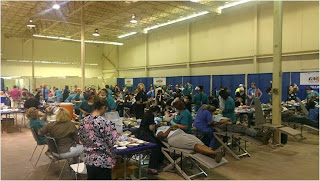By Dr. John Luther, Chief Dental Officer
This is the
perfect time to start a good habit that will last a lifetime: Brush 2 minutes,
2 times a day and every day.
Prevention is
what helps us have good oral health vs. poor oral health. The single most
important thing that you can do to protect your teeth is to brush for two
minutes, twice a day, every day of the week.
And you
should start to make this a daily routine from the time your children get their
first teeth.
Here are
some brushing tips:
Always use
a soft toothbrush. Be
sure the size of the brush allows you to reach all areas of the mouth. Replace
toothbrushes every 3-4 months. Once the bristles get worn out, get a new brush.
Replace your toothbrush after you’ve been sick.
Try not to
let the brushes of family members touch when you store them on the counter or
by the sink. You don’t want to spread bacteria from one mouth to another!
Check out this video to see how to teach your children how to brush their teeth.
Babies to
2 years: Gently wipe
the baby’s teeth with a clean damp washcloth. For kids under age 2, use a soft
toothbrush and a little water; no toothpaste is necessary. Once teeth are
cleaned at bedtime, babies should drink only plain water (no juice, milk or
soda).
Children,
2 years to 6 years:
Help your children brush their teeth. Hold the toothbrush with them and show
them how to clean every tooth surface. Help your kids place the toothbrush at
an angle against their gums. Make sure they move the brush back and forth,
gently, in short strokes. Help them brush the front, back, and top of teeth. Be
sure to use fluoride toothpaste. All you need is a pea-sized dab of fluoride
toothpaste for kids ages 2-6. Teach them to spit out the toothpaste when
they’re done and not swallow it. Teach them to gently brush their tongue to
remove germs and freshen breath.
Children,
6 years to thirteen:
Once children know how to brush, let them do this on their own, but be sure to
supervise to be sure all teeth get cleaned. Be sure to use fluoride
toothpaste.The goal is to spend 2 minutes to be sure you brush every tooth --
the front, back, chewing surfaces and sides. Teach your children how to floss
between teeth and make this part of the nighttime routine.
Teens and
Adults: We are all
busy with work, school, sports, family -- but that is no excuse for not
brushing. Clean your teeth gently but thoroughly for a full 2 minutes, getting
at all surfaces and floss between the teeth before you head off for the day
(work or school) and finish the day by brushing to remove leftover food in your
mouth. Your goal is to remove food that will decay and cause acids that will
attack the tooth’s enamel and also to remove plaque that sticky film of germs
that forms on teeth and gums after eating. Plaque that’s not removed by
brushing twice a day and flossing once a day can lead to cavities.
Bookmark
this website: www.2min2x.org. You’ll
find charts that show how teeth develop from babies to young adults.
There are free, two-minute videos featuring notable characters from children’s
shows and networks, including Sesame Street and
Cartoon Network— that kids can watch while brushing. And parents/caregivers can
register their mobile phone and get kids oral health tips via SMS messages.
Subscribe by texting “BRUSH” to 30364 or by visiting the homepage of 2min2x.org.
And
remember this: Simple, repetitive tasks will become habit in just 21 days.
Start on November 1 and make it your goal to brush 2 minutes, twice a day,
every day. You can do this!
DentaQuest
will be tweeting encouragement and reminders all month long. Follow us
@DentaQuest






.jpg)
